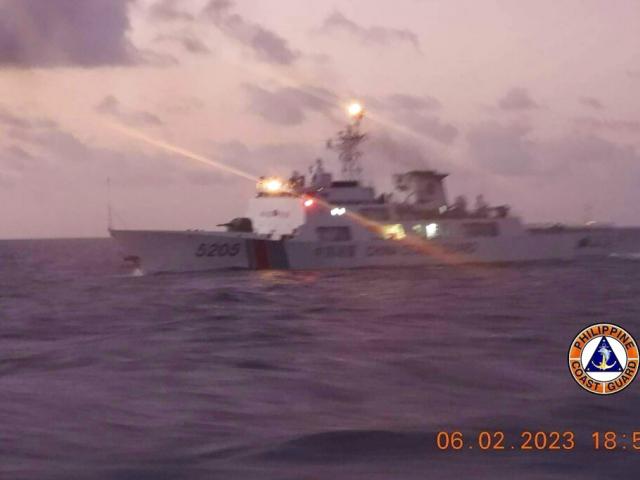China Deploys 'Little Blue Men' Militia with Water Cannons, Lasers, Ramming Tactics to Conquer Key Waterway
MANILA, Philippines – China's ambitions in the South China Sea show no signs of slowing down. In the last 10 years, Beijing has deployed significant military assets to intimidate any country challenging this key international shipping lane.
As CBN News discovered on a recent trip to the region, those depending on this vital waterway find themselves in the crosshairs of China's aggressive tactics.
Spend any amount of time with J.C. Cabanias on the water and you'll soon discover what puts a smile on his face. "I feel the happiest when I am at sea," Cabanias told CBN News. "This is the kind of job where you don't have a boss, it's based on your decision whether you'll go to sea or not."
Three generations of Cabanias' family have fished these waters here off the Philippine coast. "My father taught me how to fish. His father taught him how to fish. Ever since I was a kid, I'd join my dad when he goes to sea," Cabanias recalled.

It's a passion that he had no trouble turning into a paycheck. "This is what sustains my family, my children. I get to put food on the table for them, send them to school because of my livelihood at sea."
That livelihood now faces an increasing threat from China.
"Every time Filipino fishermen go to the West Philippine Sea, they will be greeted by the Chinese coast guards and Chinese fishermen, no matter how far they are, and they will be reminded that you have entered 'Chinese territory', so you have to leave," said Fernando Hicap, who runs Pamalakaya, the nation's largest fishing federation made up of some 80,000 members.
Hicap says that China's claim to the South China Sea, including the West Philippine Sea, puts fishermen like Cabanias on the frontlines of a possible military confrontation with Beijing.
"Before the occupation of the Chinese government in the West Philippine Sea and larger South China Sea, the area used to be a fishing ground for all fishermen from different countries," Hicap told CBN News. "Malaysians, Indonesians, Vietnamese, go there too, Taiwanese also, and Chinese. During that time, there were no stories of fights or rivalry between the fishermen. But now, the Chinese presence is so destructive."
The Philippine government warned world leaders at the recent Munich Security Conference that China's harassment of Filipino fishermen and the country's coast guard is now a daily occurrence.
"It's clear to us what China wants: They want to occupy the West Philippine Sea and the whole South China Sea area," Hicap said.
A Chinese coast guard ship hit a Philippine coast guard vessel last month with a military-grade laser, temporarily blinding some of the crew aboard the Philippine vessel. Several Filipino fishermen were also targeted and forced to move away from the area.

A Chinese coast guard ship threatens Filipino boats in the disputed South China Sea, Feb. 6, 2023. (Philippine Coast Guard via AP)
"What will happen if we can't go to the sea anymore? Then I'll lose my family, my kids. They will starve. How can they go to school? What will happen if we can't fish at sea anymore? That's why this sea is important to us," said Cabanias.
The Philippine government lodged more than 200 protests against Chinese intimidation and harassment in 2022 alone.
To avoid direct military confrontation and still maintain a high level of intimidation, the Chinese government has deployed a maritime militia, mostly made up of commercial Chinese fishermen, to prowl these waters.
***Please sign up for CBN Newsletters and download the CBN News app to ensure you keep receiving the latest news from a distinctly Christian perspective.***
"They are trained by the PLA (People's Liberation Army) and their wages are funded by the PLA Navy," Carl Schuster, a professor with Hawaii Pacific University, told CBN News.
A retired Navy captain and former director of operations at the U.S. Pacific Command's Joint Intelligence Center, Schuster told CBN News that the militia has hundreds of commercial boats and thousands of crew members at their disposal.
"The advantage of using the maritime militia is ostensibly they are commercial crafts; if you check the ownership papers, they go back to a commercial entity somewhere and that gives the Chinese government plausible deniability," said Schuster.
In 2021, more than 200 Chinese fishing boats converged on the Whitsun Reef, an area under Philippine control in the South China Sea.
"Their basic tactics is to intimidate local fishermen into leaving the area so that China gains control of the waters by default," Schuster said.
The militia, dubbed as China's "Little Blue Men" because of the blue-painted color of their vessels, are trained to carry out offensive maneuvers, especially around disputed territories.
"It's called 'Grey-Zone' operations," Schuster explained. "They stop short of committing an act of war but they will use their water cannon on local fishing boats, they'll bump them, ram them, sink them and then leave them."
Experts say China's hybrid warfare here is like how Moscow deployed its Russian "Little Green Men" to infiltrate and take over Crimea in 2014.
"In theory, they could do even more than that if they ever wanted to launch an attack, they could even use some fishing boats clandestinely or surreptitiously to carry weapons or carry soldiers or what have you," Michael O'Hanlon with Washington, DC-based Brookings Institution, told CBN News.
It's one big reason why the Philippines and neighboring countries are reluctant to openly challenge the Chinese on the high seas.
"When they come up on one of these craft violating local rules are they approaching a purely commercial craft or are they approaching an armed ship? Nations, particularly in southeast Asia where China is much more powerful than they are, they are very wary of interfering with any Chinese commercial fishing activity for fear of what they might be encountering," Schuster told CBN News.

Back on his boat, J.C. Cabanias is thrilled that the United States and the Philippines are strengthening their military ties. Both countries are set to resume joint patrols of the South China Sea.
"We Filipinos need to stay strong as well so the Chinese will see that we are not scared of them," Cabanias told CBN News. "The more we look intimated the more they want to occupy us. We Filipinos need to show our strength. We need to fight for our rights."




